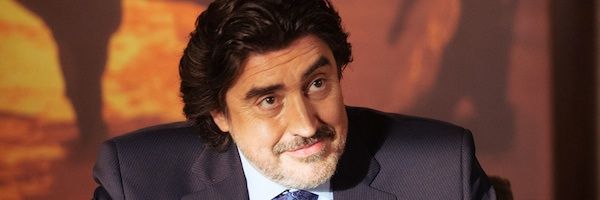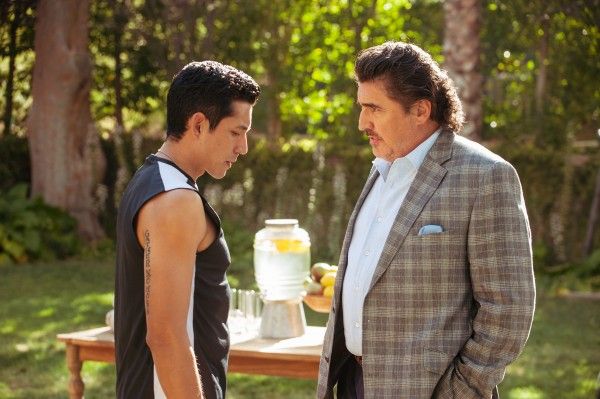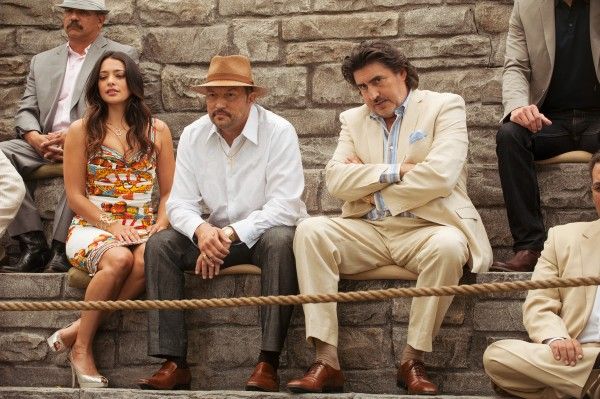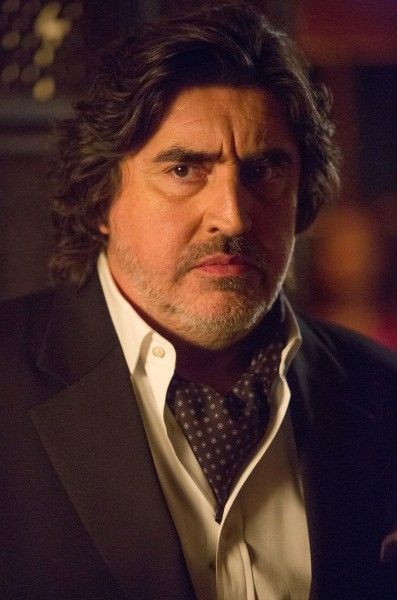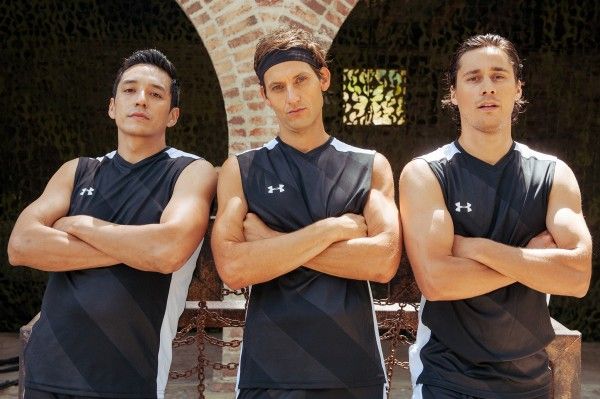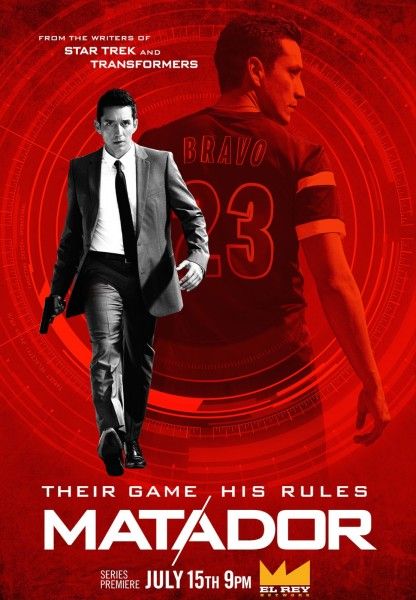From writer/producer Roberto Orci, the 13-episode El Rey series Matador is an action-packed, fun, sexy, dangerous look at the world of an undercover CIA operative masquerading as a professional soccer star. Tony “Matador” Bravo (Gabriel Luna) becomes a professional soccer player for the LA Riot, in order to use his skills as a covert operative to get close to ruthless billionaire team owner Andrés Galan (Alfred Molina) and execute missions for the CIA.
Back in May, Collider (along with one other online outlet) was invited to spend an afternoon on the set, which just happened to be a $40 million ranch property out in Simi Valley, where we got to watch them shoot Episode 5, directed by Dwight Little (who also did the Season 1 finale of From Dusk Till Dawn). The family environment and camaraderie was obvious when, even though it was all work when the cameras were rolling, between shot set-ups, the actors would continue to practice soccer between takes and, at one point, a crew member even picked up a guitar and started strumming while show star Gabriel Luna sang along. On his lunch break, we spoke to veteran actor Alfred Molina about how he came to be a part of this show, how delighted he is to be playing the villain, where his character has progressed to, at this point in the season, and the freedom in working on television. Check out our Alfred Molina Matador interview after the jump. Episode 5 airs tonight.
Question: How did you come to this?
ALFRED MOLINA: Agents aren’t usually very clear when it comes to describing what the premise of something is. And when it was first described to me, I thought, “That doesn’t make much sense. A soccer player who turns out to be James Bond? No.” It sounded a little preposterous. But when I met with Dan Dworkin and Jay Beattie, the showrunners, and Heather [Kadin], who is the executive producer from K/O, they talked about the project in absolutely clear terms. What they were able to convey was the tone of it, which is that it’s action-adventure with quite bit of comedy, and it’s sexy. And it’s got enough of its tongue in its cheek. If he’s a full-time soccer player, when has he got time to save the world?” That’s the wonderful thing about entertaining shows. If you get the tone right and you get the style right, you can get away with anything. Once the audience buys into it and hopefully enjoys it, they’ll go on that journey with you. So, I saw the potential reasonably early, and I didn’t need too much persuading. And the money’s not bad either.
How did you react to playing the villain?
MOLINA: I was delighted. I’ve got no problems with playing the villain. People say, “Aren’t you tired of playing the bad guy?” And I say, “No, playing the bad guy put two kids through college.” I’ve got no problems with that. But, he’s not just the bad guy. He’s not just a mustachio-twirling, two-dimensional villain. He’s got a relationship with a daughter that is difficult and complicated. He’s got a backstory for how he lost his wife. And he’s got one version of it, and his daughter’s got another. He’s running this huge empire. He made his fortune in telecommunications, and he’s now the owner of this huge fútbol team. On the face of it, he looks like one of the most successful businessmen on earth. And then, suddenly, we discover there’s this whole other side to him that is really villainous and a little bit creepy and a little bit sinister. He’s still managing to be this charming guy, who wins people over. Everyone walks away from a moment with Galan going, “Oh, what a great guy!” It’s a character with layers and possibilities to explore and different storylines. It would’ve been a different thing if it had been someone who just walks around and kills people and bangs them on the head. There’s so much more to it than that.
Where has Andrés Galan progressed to, now that you’re shooting Episode 5?
MOLINA: He started off as this rather cold, slightly distanced character. And when Tony Bravo comes into his circle, there’s a slight stand-off between them. He’s not quite sure what to make of him. They don’t trust each other very much. But as we progress through the episodes, we’ve reached a point now where Galan actually needs Tony. As far as Galan’s concerned, Tony’s proved himself as very useful, and as someone who can he possibly rely on. They reluctantly become more inter-dependent. Of course, Tony’s got his own agenda, and Galan has got his agenda. But while they’re keeping both of those agendas secret from each other, they manage to create this strange, fascinating bond with each other.
What’s it like to find such a complex character on TV, and how have you seen television progress, over the last few years?
MOLINA: I think it’s a combination of things. First of all, I think the audience has realized that it can handle a lot more in its own living room than the TV networks originally allowed them to handle. In the old days – and I say “the old days” because I’ve been acting for 40 years, so I’m in a position to make this judgment – when I first started working in TV, the given intelligence was that in the movies, you’re the host, so you can call the shots. On TV, you’re the guest in someone’s home. That made it a very different relationship to the audience. You were in someone’s home, every week, so you had to mind your P’s and Q’s. You don’t go visit people and stick your feet up on the coffee table, unless you’re invited to. Cable changed all of that because cable was like you were buying a movie. HBO set the ball rolling, and then others followed. So, the relationship between the audience and the product changed. And this seems like a trivial point, but TVs got bigger, so the experience of watching TV was different. It’s like watching a movie.
I once had a conversation with Marshall Brickman, who wrote a lot of the early Woody Allen movies. He’s a very successful writer. I asked him, during this conversation, about what was it about working at HBO or on cable that was so attractive, and he basically said, “Because I can say fuck.” Now, he was making a joke, but it was actually a trivial point that illuminated a rather deeper truth. The freedom that writers suddenly had and directors had, in terms of what kind of story they can tell and how they can tell it, was all up for grabs. And so, now you’ve got a situation where TV is essentially the new independent film. It’s where the best writing is happening. It’s where some of the best acting is going on. It’s where some of the best directors are working. They’ve suddenly got this freedom, and all the tradition values of having to do 22 episodes is all out of the window now. I’m amazed, for instance, that the networks are still using the Neilsen ratings system. I can’t remember the last time I watched a TV show at the moment it’s transmitted. DVR changed everything. I think that’s why the whole notion of what’s acceptable on TV has changed.
Did getting a full season without having to do a pilot first make this more attractive?
MOLINA: Yes, and we went straight to 13 episodes. There was none of the usual jumping through hoops. I had lunch with Dan Dworkin and Jay Beattie and Heather Kadin, and they basically said, “This is what we’re doing. Would you fancy it?” And I went, “Yeah, okay.” Also, I think there’s another added thing with Robert Rodriguez, who’s actually created a network in his own creative image. He’s creating the kind of network that he would want to watch, which is always the best way to create anything. You create what you love, and somewhere along the line, you hope that other people love it as much as you do.
Are you completely open to film and TV projects, at all times?
MOLINA: At the moment the work is happening, when they shout, “Action!,” and the actor starts doing his or her thing, is exactly the same, whether it’s on a digital camera, on a TV set, or if it’s some big Panavision thing. It’s the same moment. The only difference we’re talking about, really, is the packaging. The creative work and the joy of exercising you craft is the same. It doesn’t really make any difference.
Matador airs on Tuesday nights on the El Rey Network. Click here for all our Matador cobverage.

